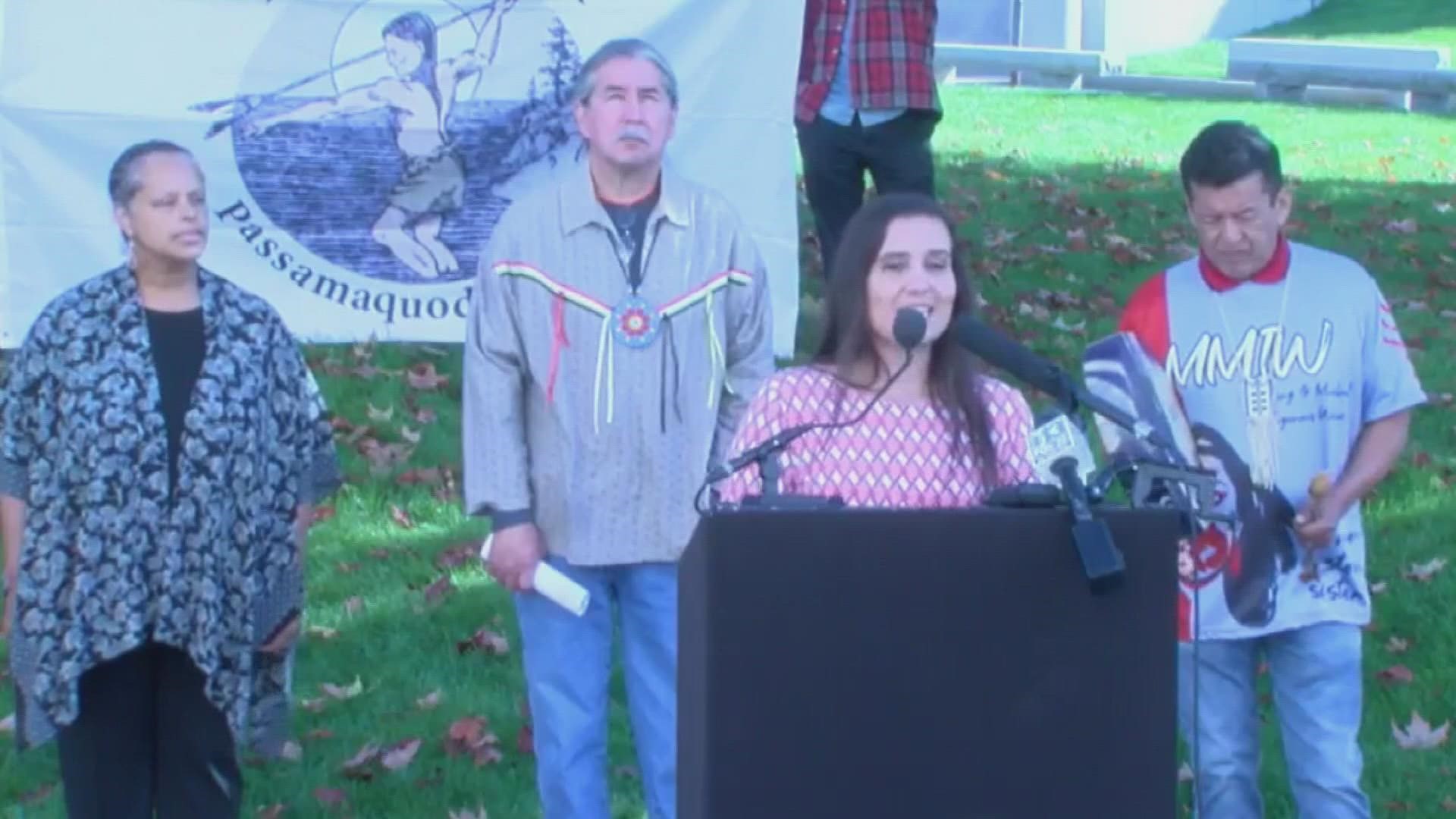MAINE, USA — On Indigenous Peoples Day, Mainers celebrate and honor native American people in the four Maine tribes.
Three years ago, Governor Janet Mills signed a law changing Columbus Day to Indigenous Peoples Day.
Many of the state's tribal leaders said at a rally in Augusta that Indigenous Peoples Day in Maine, feels empty. They said it can't be truly celebrated until Maine restores their rights.
Monday morning, tribal leaders and supporting politicians spoke one by one in front of the statehouse, saying the recognition of Indigenous Peoples Day is a step in the right direction, but much more has to be done. They said they want their lands back, their resources, their sovereignty, and that they've been mistreated for decades.
In the legislature, Senate President Troy Jackson and House Assistant Majority Leader Rachel Talbot-Ross, say they are working to make sure Maine's tribes are treated more like the other 570 recognized tribes in the other 49 states.
"200 years of state governance, over tribal nations have produced extreme poverty, short life expectancies, poor health, limited educational opportunities, and diminished economic development in their communities," representative Talbot-Ross said.
"It's time that we do something different. It's time that we do what is right for the tribes and the people in the state of Maine, you heard it here today, people that have been waiting forever for this to happen," President Jackson said.
Representative Talbot-Ross is sponsoring a bill that's expected to be taken up in January, LD 1626 ("An Act Implementing the Recommendations of the Task Force on Changes to the Maine Indian Claims Settlement Implementing Act").
Talbot-Ross said LD 1626 would advance tribal sovereignty.
"A bill to advance tribal sovereignty, and as the truth demands us to acknowledge, the unfortunate restoration of those inherent rights," she said.
The bill was carried over from this past session, so it will be taken up again early next year when the legislature returns in January.
Mills administration said Monday it remains committed to finding a common ground and making important progress with Maine's tribal leaders.
"The only true way to celebrate Indigenous Peoples Day in Maine is to change the system, that treats us differently than any other tribe in the country," chief Maggie Dana from the Passamaquoddy Tribe at Pleasant Point said.
Chief Dana said it's a day to look at how little has changed since Mills established the day.
"She supports a day, but she won't recognize our sovereignty, so her actions are not lining up with her words," Chief Dana said.
"Maine has existed for about 200 years, our people have been here for at least 12,000," Maulian Dana, Ambassador of Penobscot Nation, said.
Maulian Dana said it's only fair for tribe members in Maine to receive what was taken away from them.
"We have been silenced and oppressed in our homeland for generations," Maulian Dana said.
"And that would be by doing what should have been done so many years ago, that was taken away from the tribes, and fighting and making sure that they get everything that they deserve because that's just what's right. It's the right thing to do and that's what we should be doing as a state government," Jackson said.
In a statement on Indigenous Peoples Day that Mills sent out, she said, "Maine’s culture is in large part the direct result of those who first hunted, farmed, fished, and occupied much of the land that we call our home. On Indigenous Peoples Day, let us pay tribute to those who were the first stewards of this land we love; celebrate their many contributions to our great state; and recommit ourselves to our shared home and future, with respect and trust for one another.”
Besides signing an act to replace Columbus Day with Indigenous Peoples Day three years ago, the press secretary for Mills said she has prohibited Native American mascots; reinvigorated the Maine Indian Tribal State Commission, strengthened water quality standards, provided Tribal Nations jurisdiction to prosecute non-tribal members for domestic violence against its members, established a permanent appointment of a member of the Wabanaki Tribes to the University of Maine System Board of Trustees, extended the time for Maine’s Tribal Nations to acquire land in trust, and introduced and signed into a law that authorized the State to convey to the Passamaquoddy Tribe.
"We must acknowledge the state’s failure to provide full rights to Maine's native population into the present day. It's not fair, it never has been, and, especially as elected officials, we must do what we can to acknowledge that painful past in order to create a better future, together," Jackson said.
On the holiday, Congresswoman Chellie Pingree (D) announced she is co-sponsoring legislation that would make Indigenous Peoples Day a federal holiday, replacing Columbus Day.
Pingree said Maine is among the 13 states, including the District of Columbia, that recognizes Indigenous Peoples Day as a holiday on the state level.
“For Indigenous people, Columbus Day has long been a painful reminder of the suffering that was inflicted on their ancestors, and an illustration of the ongoing disparity in opportunity and treatment offered to them by the federal government. I am proud that three years ago Maine took overdue steps to recognize the Wabanki Confederacy and acknowledge this painful legacy by declaring the second Monday in October to be Indigenous Peoples’ Day. However, we need a national reckoning, too. By declaring Indigenous Peoples’ Day a federal holiday, Americans have the opportunity to acknowledge our shared history and recognize native tribes as this land’s true first inhabitants,” Pingree said.

